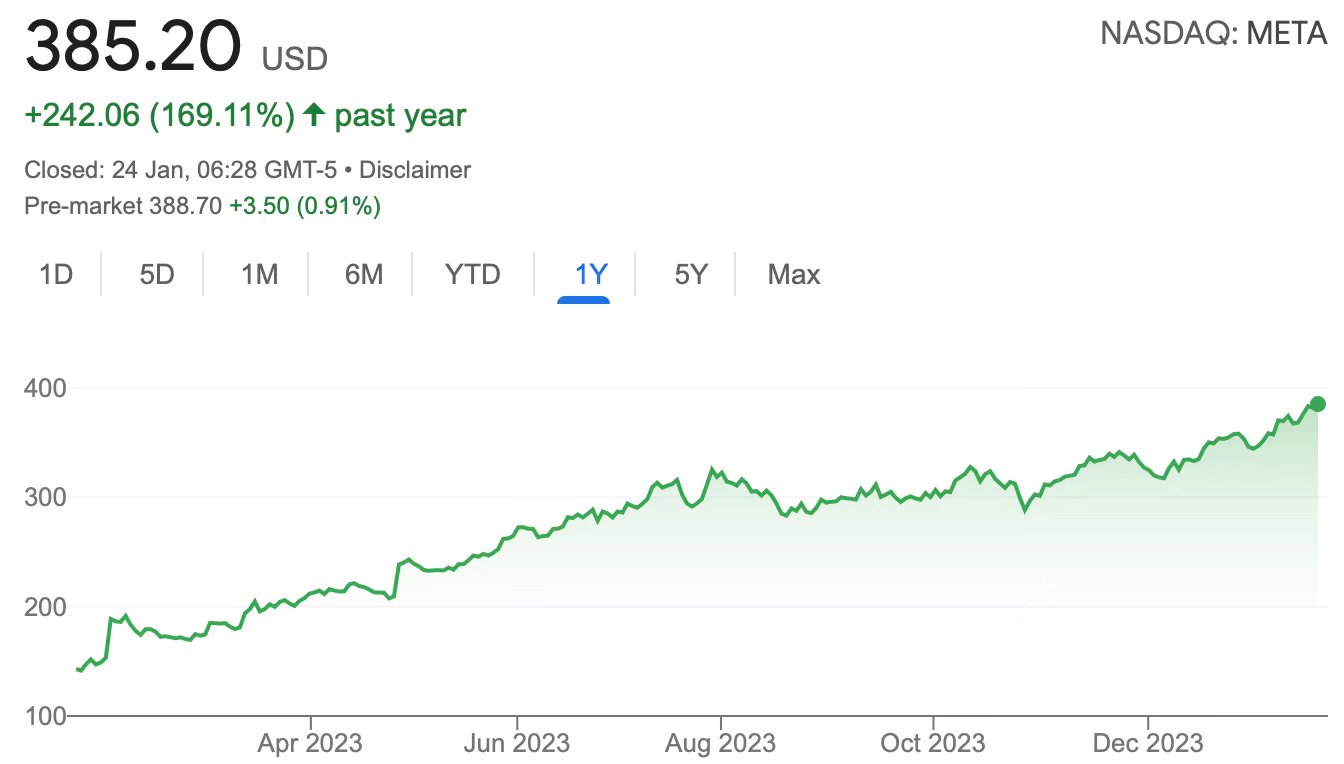Meta's Shiny Object Syndrome
The pivot to A.I. is not for the benefit of everyone; it's a stock-juicing manoeuvre
On Monday, Meta's shares hit a new all-time intraday high.
Last Friday, the company enjoyed its first record-high close since 2021.
The shares are up over 160% YTD and over 300% since November 2022.
It's been quite the turnaround. The company endured such a torrid 2022 — dropping revenues, whistleblowers, leaked data showing the company knew Instagram negatively affects the mental health of teenagers, the Capital Hill investigation, Apple's ad-tracking changes, and the disastrous Metaverse venture — that it wiped out the entirety of its pandemic gains. The stock price sank to its lowest since January 2019, when Facebook was dealing with the aftermath of the Cambridge Analytica crisis. The stock price even flirted with dropping below $100; it hadn't been that low since late 2015.
It was bad. It had some people (me included) questioning the company's future under Zuckerberg's leadership. But since then, it's been up, up, and away.
What changed, you ask? Did Meta fix its core products, and regain the social media crown? Not really. Did it innovate new product categories that transformed its fortunes? Come on, let's not kid ourselves. Did it relaunch the Zuck Buck? No, that ship has sailed. Did the company finally start delivering on its Metaverse gamble — on which Zuckerberg said "people will look back a decade from now and talk about the importance of the work being done here" — that has set fire to tens of billions of dollars to date?
Of course not. It doesn't even have legs yet.
No, the stock recovered because Meta fired thousands of employees in its "year of efficiency" and once again pivoted to the newest shiny object — A.I.
Artificial Unintelligence
At first, the company was somewhat in stealth mode, debuting its large language model LLaMA in March with little pre-match fanfare. Then, at the tail end of last year, came A.I. celebrity personas — A.I. chatbots with the faces of celebrities that were paid millions of dollars for their likeness — which were truly awful use cases for artificial intelligence. Over the months, there has been more and more talk about A.I. stuffing its core product suite of Facebook, Instagram, and WhatsApp.
The market gobbled it up. The stock ticked up.
So, why not double down?
The pursuit of AGI has given Zuck an out, a way to move past the car crash that was the Metaverse and back onto more "thing of the moment" territory. His favorite ground to stand on. In an Instagram post last week, Zuck gave an update on Meta's A.I. efforts. He said he was "bringing Meta's two A.I. research efforts closer together" to "support our long-term goals of building general intelligence, open-sourcing it responsibly, and making it available and useful to everyone in all of our daily lives."
It signals that Meta has fully jumped on the bandwagon, which raises some questions.
Is this just another Metaverse? Artificial General Intelligence is the new hot thing, so much so that it's already losing meaning (and it’s potential already being strangely downplayed by others in the field, like Sam Altman). Considering it is, to this point, entirely theoretical, perhaps even impossible, what is "general intelligence"? What does it mean to Meta? What does it mean to Joe Bloggs? This venture has all the similar trappings of the Metaverse; it's vague and vaporous, pushed on us by those who will profit from it, whether we want it or not. As we saw with the Metaverse, you're fighting a losing battle without a foundation of understanding and demand. So, how will Meta combat this? What exactly are they aiming towards, and why should we buy into that? For now, it seems content touting the same catchy buzzwords over and over.
And in what way will this A.I. be open-source? Surely, even if this does happen, only a fraction of the wider system can be made available? It can't be safe, or a smart business move, to upload a powerful, fully complete AGI model for anyone to use as they please. There are just too many bad actors. The thought makes me shudder. It's more likely that it will "responsibly open-source" to the point that Zuck and Meta deem responsible, which is slightly ironic, given the company's horrific track record for privacy. Meta has massive amounts of highly sensitive information about us, yet offers little transparency about how they use it — or they will protect it — as they build A.I. products. As the A.I. arms race heats up and potentially huge profits are at stake, it's reasonable to assume that our data protection is hardly the biggest priority.
The triple pivot
Zuck is spinning this move to A.I. as developing something that “benefits everyone.” But it's not about that. It's not about innovating or improving products or because the company holds true beliefs in A.I. and its potential. It's not about delivering products or models that provide a net gain for humanity.
It's a stock-juicing maneuver.
It's a ploy to keep Meta relevant for as long as possible, as its core products continue to die a slow death, and its pipe dream, the Metaverse, remains grounded.
And should it fail, we can look forward to watching Zuck pivot from the pivot (from the pivot) in a desperate pursuit of the next trend.
The Metaverse saga gives us the blueprint for how this will likely play out. When the rebrand to Meta was announced, the Metaverse was heralded as the company's long-term play. It was going to be a decade in the making. Then, no one cared. In the end, it lasted two years and has now been supplanted by A.I.
But, what the Metaverse proved is that big, flashy pivots to the latest "it thing" don't always result in real innovation and certainly not profits.
Meta's venture into A.I. has all the makings of the same outcome.





